在之前的字节码分析中缺少对异常的介绍,这次主要来对字节码异常表相关的东东进行一个学习,下面先来编写一个相关异常的小程序:
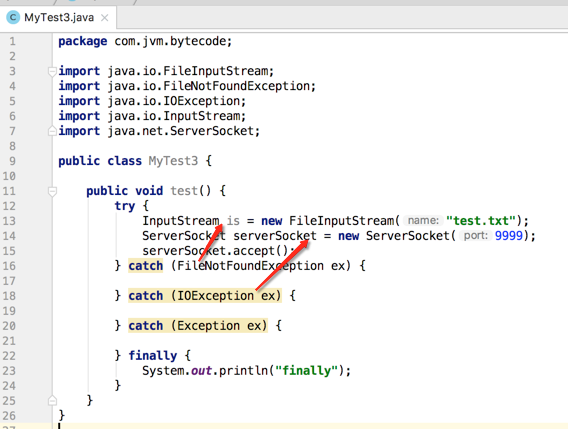
接着编译来看用javap -verbose来查看一下它的字节码信息:
xiongweideMacBook-Pro:classes xiongwei$ javap -verbose com/jvm/bytecode/MyTest3.class Classfile /Users/xiongwei/Documents/workspace/IntelliJSpace/jvm_lectue/out/production/classes/com/jvm/bytecode/MyTest3.class Last modified Sep 26, 2018; size 1056 bytes MD5 checksum 67ac394f07ca1303eb0119b94486d428 Compiled from "MyTest3.java" public class com.jvm.bytecode.MyTest3 minor version: 0 major version: 52 flags: ACC_PUBLIC, ACC_SUPER Constant pool: #1 = Methodref #15.#35 // java/lang/Object."<init>":()V #2 = Class #36 // java/io/FileInputStream #3 = String #37 // test.txt #4 = Methodref #2.#38 // java/io/FileInputStream."<init>":(Ljava/lang/String;)V #5 = Class #39 // java/net/ServerSocket #6 = Methodref #5.#40 // java/net/ServerSocket."<init>":(I)V #7 = Methodref #5.#41 // java/net/ServerSocket.accept:()Ljava/net/Socket; #8 = Fieldref #42.#43 // java/lang/System.out:Ljava/io/PrintStream; #9 = String #44 // finally #10 = Methodref #45.#46 // java/io/PrintStream.println:(Ljava/lang/String;)V #11 = Class #47 // java/io/FileNotFoundException #12 = Class #48 // java/io/IOException #13 = Class #49 // java/lang/Exception #14 = Class #50 // com/jvm/bytecode/MyTest3 #15 = Class #51 // java/lang/Object #16 = Utf8 <init> #17 = Utf8 ()V #18 = Utf8 Code #19 = Utf8 LineNumberTable #20 = Utf8 LocalVariableTable #21 = Utf8 this #22 = Utf8 Lcom/jvm/bytecode/MyTest3; #23 = Utf8 test #24 = Utf8 is #25 = Utf8 Ljava/io/InputStream; #26 = Utf8 serverSocket #27 = Utf8 Ljava/net/ServerSocket; #28 = Utf8 StackMapTable #29 = Class #47 // java/io/FileNotFoundException #30 = Class #48 // java/io/IOException #31 = Class #49 // java/lang/Exception #32 = Class #52 // java/lang/Throwable #33 = Utf8 SourceFile #34 = Utf8 MyTest3.java #35 = NameAndType #16:#17 // "<init>":()V #36 = Utf8 java/io/FileInputStream #37 = Utf8 test.txt #38 = NameAndType #16:#53 // "<init>":(Ljava/lang/String;)V #39 = Utf8 java/net/ServerSocket #40 = NameAndType #16:#54 // "<init>":(I)V #41 = NameAndType #55:#56 // accept:()Ljava/net/Socket; #42 = Class #57 // java/lang/System #43 = NameAndType #58:#59 // out:Ljava/io/PrintStream; #44 = Utf8 finally #45 = Class #60 // java/io/PrintStream #46 = NameAndType #61:#53 // println:(Ljava/lang/String;)V #47 = Utf8 java/io/FileNotFoundException #48 = Utf8 java/io/IOException #49 = Utf8 java/lang/Exception #50 = Utf8 com/jvm/bytecode/MyTest3 #51 = Utf8 java/lang/Object #52 = Utf8 java/lang/Throwable #53 = Utf8 (Ljava/lang/String;)V #54 = Utf8 (I)V #55 = Utf8 accept #56 = Utf8 ()Ljava/net/Socket; #57 = Utf8 java/lang/System #58 = Utf8 out #59 = Utf8 Ljava/io/PrintStream; #60 = Utf8 java/io/PrintStream #61 = Utf8 println { public com.jvm.bytecode.MyTest3(); descriptor: ()V flags: ACC_PUBLIC Code: stack=1, locals=1, args_size=1 0: aload_0 1: invokespecial #1 // Method java/lang/Object."<init>":()V 4: return LineNumberTable: line 9: 0 LocalVariableTable: Start Length Slot Name Signature 0 5 0 this Lcom/jvm/bytecode/MyTest3; public void test(); descriptor: ()V flags: ACC_PUBLIC Code: stack=3, locals=4, args_size=1 0: new #2 // class java/io/FileInputStream 3: dup 4: ldc #3 // String test.txt 6: invokespecial #4 // Method java/io/FileInputStream."<init>":(Ljava/lang/String;)V 9: astore_1 10: new #5 // class java/net/ServerSocket 13: dup 14: sipush 9999 17: invokespecial #6 // Method java/net/ServerSocket."<init>":(I)V 20: astore_2 21: aload_2 22: invokevirtual #7 // Method java/net/ServerSocket.accept:()Ljava/net/Socket; 25: pop 26: getstatic #8 // Field java/lang/System.out:Ljava/io/PrintStream; 29: ldc #9 // String finally 31: invokevirtual #10 // Method java/io/PrintStream.println:(Ljava/lang/String;)V 34: goto 84 37: astore_1 38: getstatic #8 // Field java/lang/System.out:Ljava/io/PrintStream; 41: ldc #9 // String finally 43: invokevirtual #10 // Method java/io/PrintStream.println:(Ljava/lang/String;)V 46: goto 84 49: astore_1 50: getstatic #8 // Field java/lang/System.out:Ljava/io/PrintStream; 53: ldc #9 // String finally 55: invokevirtual #10 // Method java/io/PrintStream.println:(Ljava/lang/String;)V 58: goto 84 61: astore_1 62: getstatic #8 // Field java/lang/System.out:Ljava/io/PrintStream; 65: ldc #9 // String finally 67: invokevirtual #10 // Method java/io/PrintStream.println:(Ljava/lang/String;)V 70: goto 84 73: astore_3 74: getstatic #8 // Field java/lang/System.out:Ljava/io/PrintStream; 77: ldc #9 // String finally 79: invokevirtual #10 // Method java/io/PrintStream.println:(Ljava/lang/String;)V 82: aload_3 83: athrow 84: return Exception table: from to target type 0 26 37 Class java/io/FileNotFoundException 0 26 49 Class java/io/IOException 0 26 61 Class java/lang/Exception 0 26 73 any LineNumberTable: line 13: 0 line 14: 10 line 15: 21 line 23: 26 line 24: 34 line 16: 37 line 23: 38 line 24: 46 line 18: 49 line 23: 50 line 24: 58 line 20: 61 line 23: 62 line 24: 70 line 23: 73 line 24: 82 line 25: 84 LocalVariableTable: Start Length Slot Name Signature 10 16 1 is Ljava/io/InputStream; 21 5 2 serverSocket Ljava/net/ServerSocket; 0 85 0 this Lcom/jvm/bytecode/MyTest3; StackMapTable: number_of_entries = 5 frame_type = 101 /* same_locals_1_stack_item */ stack = [ class java/io/FileNotFoundException ] frame_type = 75 /* same_locals_1_stack_item */ stack = [ class java/io/IOException ] frame_type = 75 /* same_locals_1_stack_item */ stack = [ class java/lang/Exception ] frame_type = 75 /* same_locals_1_stack_item */ stack = [ class java/lang/Throwable ] frame_type = 10 /* same */ } SourceFile: "MyTest3.java"
其中重点观注一下test()方法的信息:


其中stack表示这个方法运行的任何时刻所能达到的操作数栈的最大深度;local表示方法执行期间创建的局部变量的数目,包含用来表示传入的参数的局部变量。args_size表示方法的参数的总个数。
下面首先来解释一下为啥args_size等于1,很明显咱们这个方法是一个无参的定义,关于这个在之前的学习中已经解释过了,这里再巩固一下:对于Java类中的每一个实例方法(非static方法),其在编译后所生成的字节码当中,方法参数的数量总是会比源代码中方法的参数的数量多一个(this),它位于方法的第一个参数位置处;这样,我们就可以在Java的实例方法中使用this来去访问当前对象的属性以及其它方法。这个操作是在编译期间完成的,既由javac编译器在编译的时候将对this的访问转化为对一个普通实例方法参数的访问,接下来的运行期间,由JVM在调用实例方法时,自动向实例方法传入该this参数。所以,在实例方法的局部变量表中,至少会有一个指向当前对象的局部变量【也就是会存在于下面要分析的locals中】。
接着来看一下locals,为啥有4个局部变量呢?下面来分析一下:
1、当然就是隐含的this啦,上面分析stack中标明处有说明。
2、当然就是is喽,如下: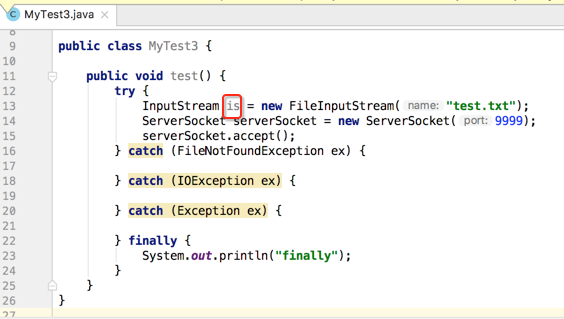
3、当然就是serverSocket喽: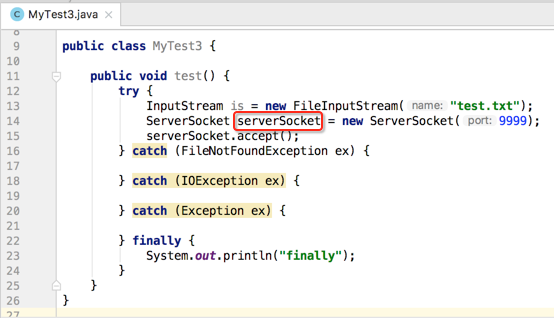
4、那它倒底是啥呢?貌似咱们能见到局部变量就木有了,其实这个局部变量是位于catch当中的,如下: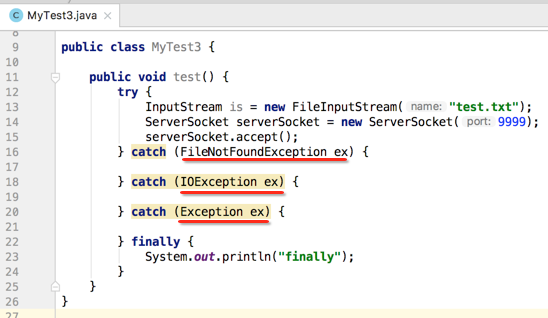
也就是如果抛出了异常,那么最终这三个异常就会产生一个局部变量,如果不抛出异常,那么这个最多4个局部变量中最终只会使用3个局部变量。
最后再来看一下statck=3,也就是这个方法最多能往栈中压入3个元素,关于栈在之后还会详述的,这里有个基本印象。
接着来则到了该篇要讨论的核心话题:异常,对应方法的code属性中exception_table,这里存放的是处理异常的信息。每一个exception_table表项由start_pc、end_pc、handler_pc、catch_type组成,那这四个元素分别代表啥呢?下面来看一下:
- start_pc和end_pc表示在code数组中的从start_pc到end_pc处(包含start_pc,不包含end_pc)的指令抛出的异常会由这个表项来处理。
- handler_pc表示处理异常的代码的开始处。catch_type表示会被处理的异常类型,它指向常量池里的一个异常表。当catch_type为0时,表示处理所有的异常。
其实异常在字节码中是存在有goto语句的,也就是当发生异常则会goto到指定的位置进行异常处理,大至看一下:
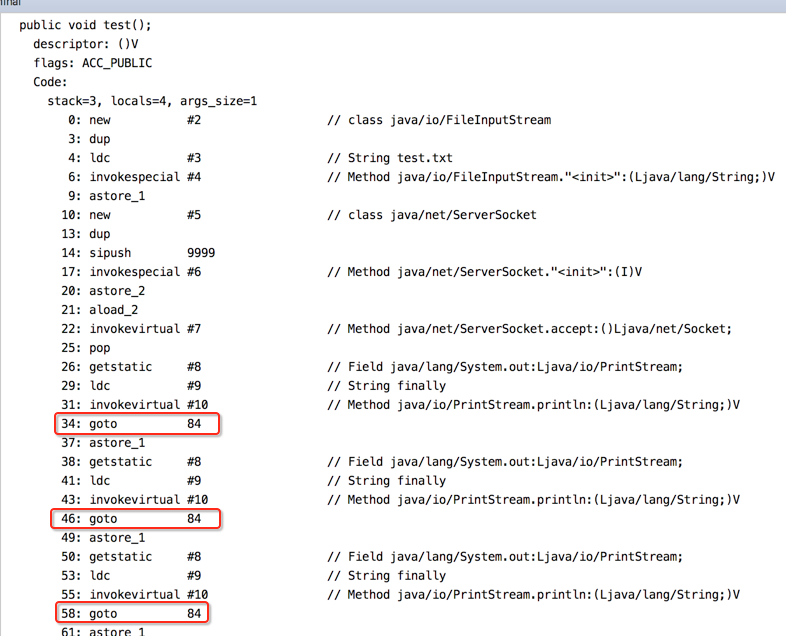
具体异常相关的分析下次再继续。